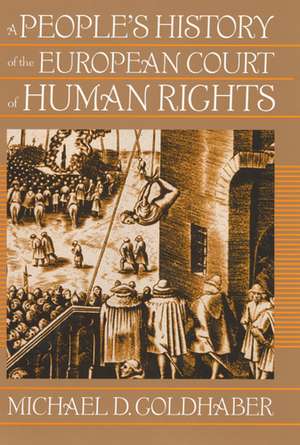A People's History of the European Court of Human Rights
Autor Michael Goldhaberen Limba Engleză Hardback – 10 apr 2007
The exceptionality of America’s Supreme Court has long been conventional wisdom. But the United States Supreme Court is no longer the only one changing the landscape of public rights and values. Over the past thirty years, the European Court of Human Rights has developed an ambitious, American-style body of law. Unheralded by the mass press, this obscure tribunal in Strasbourg, France has become, in many ways, the Supreme Court of Europe.
Michael Goldhaber introduces American audiences to the judicial arm of the Council of Europe—a group distinct from the European Union, and much larger—whose mission is centered on interpreting the European Convention on Human Rights. The Council routinely confronts nations over their most culturally-sensitive, hot-button issues. It has stared down France on the issue of Muslim immigration; Ireland on abortion; Greece on Greek Orthodoxy; Turkey on Kurdish separatism; Austria on Nazism; and Britain on gay rights and corporal punishment. And what is most extraordinary is that nations commonly comply.
In the battle for the world’s conscience, Goldhaber shows how the court in Strasbourg may be pulling ahead.
Michael Goldhaber introduces American audiences to the judicial arm of the Council of Europe—a group distinct from the European Union, and much larger—whose mission is centered on interpreting the European Convention on Human Rights. The Council routinely confronts nations over their most culturally-sensitive, hot-button issues. It has stared down France on the issue of Muslim immigration; Ireland on abortion; Greece on Greek Orthodoxy; Turkey on Kurdish separatism; Austria on Nazism; and Britain on gay rights and corporal punishment. And what is most extraordinary is that nations commonly comply.
In the battle for the world’s conscience, Goldhaber shows how the court in Strasbourg may be pulling ahead.
Preț: 827.61 lei
Preț vechi: 1133.71 lei
-27% Nou
Puncte Express: 1241
Preț estimativ în valută:
158.37€ • 172.71$ • 133.53£
158.37€ • 172.71$ • 133.53£
Carte tipărită la comandă
Livrare economică 24 aprilie-08 mai
Preluare comenzi: 021 569.72.76
Specificații
ISBN-13: 9780813539836
ISBN-10: 0813539838
Pagini: 215
Ilustrații: 12 images
Dimensiuni: 152 x 229 x 23 mm
Greutate: 0.51 kg
Ediția:None
Editura: Rutgers University Press
Colecția Rutgers University Press
ISBN-10: 0813539838
Pagini: 215
Ilustrații: 12 images
Dimensiuni: 152 x 229 x 23 mm
Greutate: 0.51 kg
Ediția:None
Editura: Rutgers University Press
Colecția Rutgers University Press
Notă biografică
Michael D. Goldhaber is a contributing editor at The American Lawyer magazine, where he previously served as Chief European Correspondent and Senior International Correspondent. Mr. Goldhaber is a graduate of Columbia Journalism School (1997), Yale Law School (1993), and Harvard College (summa cum laude, 1990). He writes widely on legal affairs, with a focus on human rights and international arbitration.
Cuprins
Acknowledgments
Introduction
Part I. The Expanding Ambit of Personal Life
1. Why Bastard?
2. When Irish Eyes Are Crying
3. Gay in a Time of Troubles
4. Dudgeon's Children
5. The Greening of Europe?
6. Dumb Immigrants
Part II. The Rights of Expression
7. Minos and Jehovah
8. Recovered Memories
9. Mohammed Comes to Strasbourg
Part III. State Violence
10. The Death Penalty, Mutilation, and the Whip
11. The Original Hooded Men
12. The Tortures of Aksoy
13. Two Faces of Kurdish Feminism
Part IV. Challenges for the Future
14. The Chechen Challenge
15. The Roma Challenge
Part V. Concluding Thoughts
16. A Constitutional Identity for Europe
17. Human Rights in Europe and America
Sources
Index
Introduction
Part I. The Expanding Ambit of Personal Life
1. Why Bastard?
2. When Irish Eyes Are Crying
3. Gay in a Time of Troubles
4. Dudgeon's Children
5. The Greening of Europe?
6. Dumb Immigrants
Part II. The Rights of Expression
7. Minos and Jehovah
8. Recovered Memories
9. Mohammed Comes to Strasbourg
Part III. State Violence
10. The Death Penalty, Mutilation, and the Whip
11. The Original Hooded Men
12. The Tortures of Aksoy
13. Two Faces of Kurdish Feminism
Part IV. Challenges for the Future
14. The Chechen Challenge
15. The Roma Challenge
Part V. Concluding Thoughts
16. A Constitutional Identity for Europe
17. Human Rights in Europe and America
Sources
Index
Recenzii
A gripping account of the stories behind the cases that have made European human rights jurisprudence the force for moral good that it is today.
A one-of-a kind account of Strasbourg law.
We in the United States, who have watched the deterioration of constitutional rights in the absence of strong judicial oversight, can learn from the remarkable example of the European Court of Human Rights in this wonderful book.
A wonderfully written and researched book that celebrates Europe's achievements in defending human rights through the stories of the victims who took their complaints to the European Court of Human Rights.
Apart from the legal issues, the stories of lives shattered by torturers are compelling and poignant . . . [G]eneral readers will be rewarded by its lively content and readability. Highly recommended.
If you haven't come across this book, all the stories behind the cases are here. It is often funny and always moving, written in a light style that celebrates all those that made the Strasbourg caselaw.
Descriere
Michael Goldhaber introduces American audiences to the judicial arm of the Council of Europe—a group distinct from the European Union, and much larger—whose mission is centered on interpreting the European Convention on Human Rights. The Council routinely confronts nations over their most culturally-sensitive, hot-button issues. It has stared down France on the issue of Muslim immigration; Ireland on abortion; Greece on Greek Orthodoxy; Turkey on Kurdish separatism; Austria on Nazism; and Britain on gay rights and corporal punishment. And what is most extraordinary is that nations commonly comply.
In the battle for the world’s conscience, Goldhaber shows how the court in Strasbourg may be pulling ahead.
In the battle for the world’s conscience, Goldhaber shows how the court in Strasbourg may be pulling ahead.
